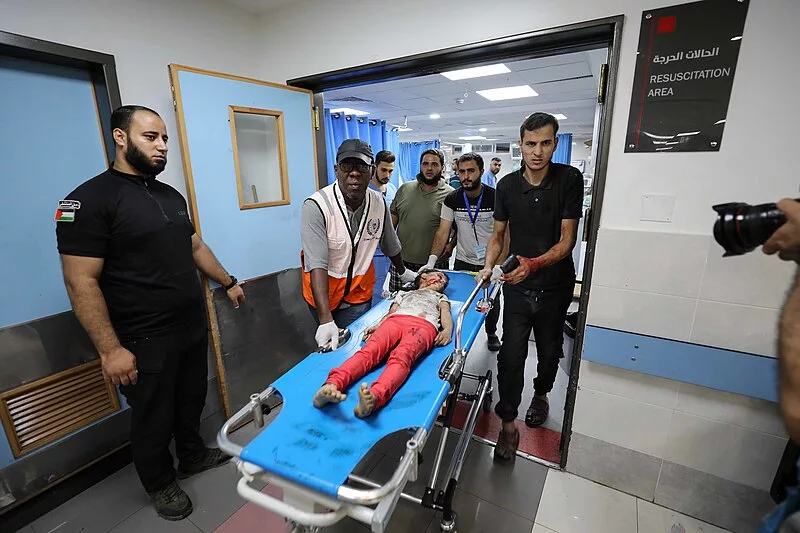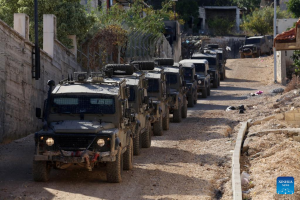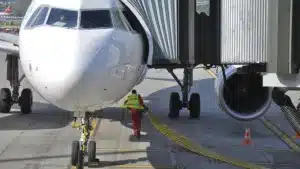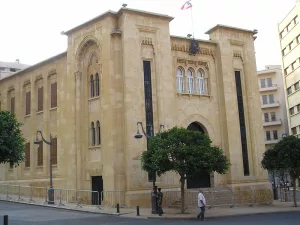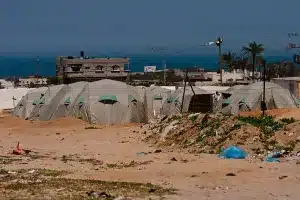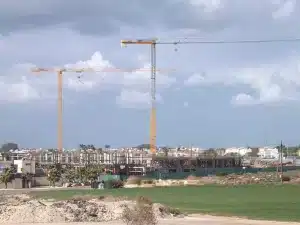Yousuf Ali, a Palestinian cancer patient, still struggled to get life-saving treatment as the deadly Israel-Hamas conflict has ravaged the Gaza Strip for 100 days.
Ali, suffering from lung cancer, said his health condition has deteriorated due to poor access to any proper medical treatment since the onset of the conflict on Oct. 7, 2023.
“For three years, I used to receive periodic treatment at hospitals in the West Bank and Israel to keep my condition stable, before the war flipped my life upside down,” the patient recalled.
The 44-year-old man was forced to leave his house and relocate to Rafah, like many of the more than 1.9 million internally displaced Gaza residents.
Since then (the start of the conflict), “I have neither received any specialty drugs nor any medical examination from a specialist,” he told Xinhua, lamenting that his pain has grown twice as intense as before.
“I am dying slowly, and no one is caring about us (the patients),” he said.
The enduring conflict has also endangered 51-year-old Samira Ziara, a heart disease patient, who also has not received any treatment since the war erupted.
“Unfortunately, my mother is witnessing a record and painful situation in light of the deterioration of her health and her lack of medical care and medicines while at the same time diseases and epidemics spread in shelters,” Samira’s son Kamal Ziara told Xinhua.
He said he could not stand to lose his mother, calling on the international community to help Gazan patients receive treatments either inside Gaza or allow them to travel outside to receive health care.
Under massive Israeli siege and bombardment, the casualties in Gaza were horrific, and the toll is still on the rise.
More than 23,800 Palestinians have been killed, and over 60,000 others were injured, according to figures released by the Gaza-based Health Ministry.
The Israeli escalation came in retaliation for an attack by Hamas, in which its militants killed about 1,200 people and took away more than 200 as hostages.
Besides the shocking deaths and injuries, Gaza is suffering from a worsening humanitarian crisis, exacerbated by power outages, fuel exhaustion, and cut-off communications.
“More than 1.9 million displaced people suffer from catastrophic conditions due to the lack of daily necessities and medical care,” Ismail Thawabta, director general of the government media office in Gaza, told Xinhua.
“Out of the 325 shelters in Gaza, only 150 have medical points at a time when most hospitals and primary health centers have been out of service,” Thawabta said.
Local medical authorities have detected more than 400,000 cases of diseases and epidemics at a time of challenges posed by harsh winter conditions, he added.
Meanwhile, only nine out of the total 36 hospitals and 19 of the 72 healthcare centers are now operating in Gaza, with their average occupancy rate being 351 percent and the occupancy rate of intensive care units (ICU) at 261 percent, according to the Hamas-run Health Ministry.
According to the media office of the Rafah crossing, 972 patients were transferred outside the enclave to receive medical care, consisting of 571 wounded and 401 patients of various diseases, including cancers.
“It is of great importance to firstly evacuate the more than 5,300 people facing serious and complex health conditions in Gaza to receive necessary and appropriate care abroad,” Ashraf al-Qedra, spokesperson of the Gaza-based Health Ministry, told Xinhua.
“We are suffering from a severe shortage of medicines and medical supplies here, including anesthesia, antibiotics, intravenous fluids, pain relievers, insulin, blood and its derivatives,” al-Qedra said.
Also, medical equipment, such as monitoring devices, respirators, incubators, X-rays, CT scans, analysis devices, and anesthesia, are not operating in hospitals due to power outages, the spokesperson noted.
Meanwhile, overcrowded shelters for the displaced, which have become a hotbed for infectious diseases amid poor sanitation and running out of sanitizers and vaccine stocks, are facing the imminent danger of a public health crisis.
According to the World Health Organization, Gaza hospitals also face a deficiency of medical staff, including surgeons, neurosurgeons, and ICU staff, while medics on the ground have to deal with extremely volatile working conditions amid fear of Israeli bombardment. ■

